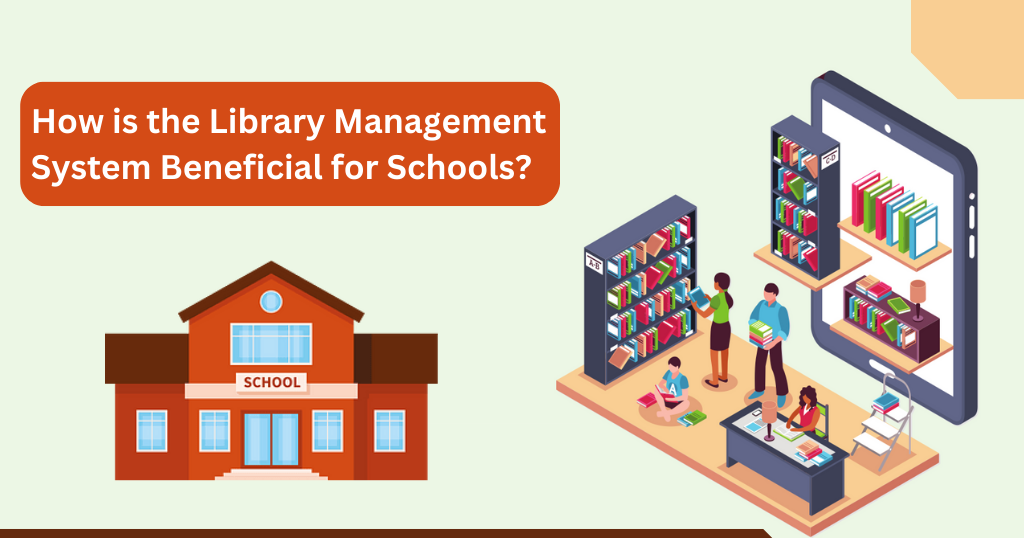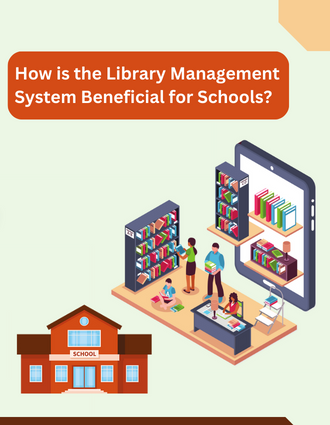In today’s digital age, education is constantly evolving, and schools are embracing technology to streamline their operations. One essential aspect that plays a significant role in a school’s success is its library.
To keep up with the changing times, schools are now adopting Library Management Systems. These advanced tools offer numerous benefits, making them a crucial component of modern school ERP software.
But first, let’s understand what library management software is.
Understanding Library Management Software

A Library Management System System is a comprehensive software solution designed to automate and streamline the operations of a library. It serves as a centralized platform for managing various library functions, including book cataloging, circulation, member management, resource tracking, and reporting. LMS enables librarians and library staff to efficiently organize, maintain, and monitor the vast collection of books, journals, multimedia, and other resources.
One of the key features of a library management system is its book cataloging capability. The software allows librarians to create a detailed database of all the library materials, complete with essential information like book titles, authors, ISBN numbers, and publication dates. With this information readily available, library users can easily search and locate the materials they need, enhancing the overall user experience.
Additionally, library automation software facilitates smooth circulation processes. When a library member wishes to borrow a book, the LMS manages the borrowing and returning transactions, keeping track of due dates and sending reminders for overdue materials. This automation reduces manual paperwork, saves time for both librarians and users and ensures an efficient borrowing and returning process.
Moreover, library management systems often come with features like reservation systems, online renewal options, and integrated communication tools. These functionalities enable users to interact with the library remotely and access resources even beyond the library’s physical boundaries.
Overall, an effective library management system optimizes library operations, improves resource accessibility, and enhances the overall management of a library, making it an indispensable tool for modern educational institutions and organizations.
Features of Library Management System
-
Cataloging and Classification
LMS offers comprehensive cataloging and classification features that enable librarians to organize and categorize library resources efficiently.
2. User Management
LMS provides user management capabilities, allowing librarians to create and manage user accounts for library members.
3. Circulation Management
The circulation management feature automates the borrowing and returning process. It keeps track of due dates, sends overdue notifications, and handles renewals and reservations, ensuring smooth and efficient library operations.
4. Digital Resource Management
Many modern LMS solutions include digital resource management capabilities, enabling libraries to manage e-books, e-journals, and other digital materials alongside physical resources. This feature expands the library’s offerings and meets the demands of digital-age users.
5. Multi-Library Management
For institutions with multiple libraries, LMS can provide centralized management of multiple branches or locations, making it easier to share resources and maintain uniform library services across the organization.
Benefits of Library Management System
Let’s delve into how a library management application system transforms schools and empowers students and educators.
1. Efficient Organization
A library management system acts as a one-stop solution for efficiently managing all library resources. From books, journals, and e-books to multimedia materials, everything is categorized and digitized, making it easy for students and staff to access resources without any hassle. The system automatically updates records, reducing the manual workload and ensuring an organized and up-to-date library collection.
2. Time-Saving Automation
Library automation software integrated into the library management system automates mundane tasks, such as book check-in and check-out, overdue reminders, and cataloging. This automation saves precious time for librarians, enabling them to focus on more critical tasks, such as providing personalized assistance to students and curating valuable reading materials.
3. Improved Accessibility and Collaboration
With library management software, students and educators can access the library’s vast collection from anywhere, anytime. Through online platforms, they can search for books, read e-books, reserve materials, and even provide book reviews. This improved accessibility fosters a culture of collaborative learning and enhances the overall academic experience.
4. Enhanced Learning Experience
Library management applications offer features like personalized reading recommendations, suggesting books based on student’s interests and academic needs. This individualized approach to learning encourages students to explore new subjects and instills a love for reading, ultimately enhancing their overall learning experience.
5. Real-Time Analytics
Library management software provides valuable insights into library usage, such as popular genres, most borrowed books, and reading trends. This data-driven approach helps schools make informed decisions about expanding their library collection, ensuring it aligns with the interests and needs of their students.
6. Seamless Integration with Curriculum
Librarians and teachers can collaborate to curate a diverse collection of resources that complement the subjects being taught. This integration ensures that students have easy access to relevant study materials and supplementary resources, enhancing their understanding of the topics.
7. Enhanced Resource Sharing
LMS enables resource sharing among multiple schools within the same network or district. This feature allows schools to exchange books and other learning materials, broadening the scope of available resources and providing students with exposure to a wider array of knowledge.
8. Personalized Reading Lists
With library management systems, librarians can create personalized reading lists for individual students or classes. These lists can include recommended books, research papers, and study materials tailored to each student’s interests and academic level. Such customization encourages students to explore beyond their comfort zones and discover new areas of interest.
9. Encouraging Reading Habits
A library management system often comes with gamification features, such as reading challenges, badges, and rewards. These elements incentivize students to read more and engage with the library resources actively. Encouraging reading habits from an early age sets the foundation for a lifetime of learning and intellectual growth.
10. Streamlined Reporting and Tracking
Librarians can generate detailed reports using LMS, allowing them to track various library metrics, such as circulation statistics, book usage, and student reading patterns. These insights help in making data-driven decisions to enhance library services and improve the overall learning environment.
Wrapping Up
Incorporating a library management system into school ERP software is a transformative step for educational institutions. The efficient organization, time-saving automation, improved accessibility, enhanced learning experiences, and real-time analytics provided by these systems empower schools to foster a culture of knowledge and curiosity among their students.
Embracing technology through LMS is a giant leap forward in providing a holistic and enriched educational journey to students, equipping them for success in the dynamic world ahead.
Proctur’s advanced library management systems help streamline your school administrative processes with ease.



